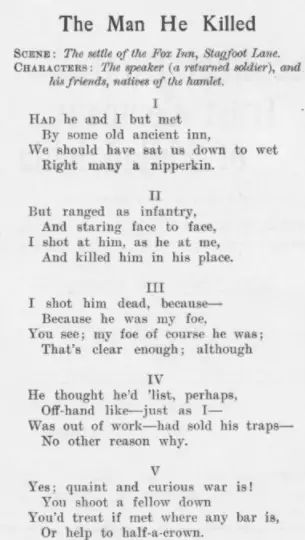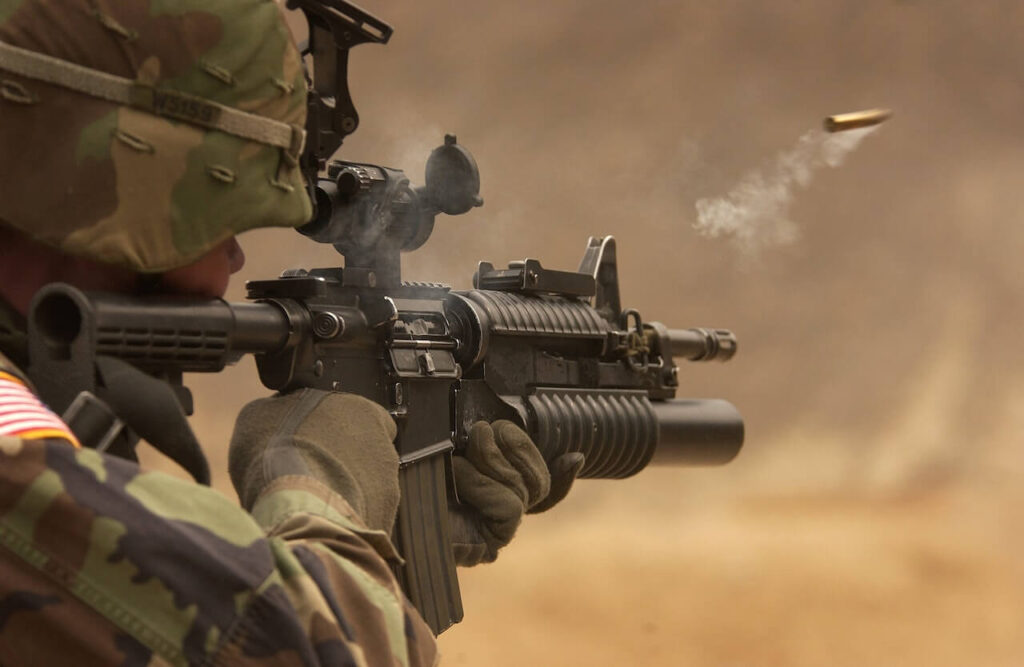Thomas Hardy’s (1840-1928) poem The Man He Killed is a lyrical monologue of a soldier who has returned from war. He’s speaking about the war to his friends and native villagers in a pub. In its 1902 original publication in Harper’s Weekly magazine, the poem’s setting is a scene inside the Foxx Inn pub.
Hardy moved a lot between London and Dorset in his life, finally settling in Dorchester. These areas were popular for their antiwar stances on the ongoing second Boer War in South Africa, which lasted from 1899 to 1902. The Man He Killed is just one of the antiwar poems the poet wrote to show the senselessness and negative effects of war.
Summary: The Man He Killed by Thomas Hardy

The poem starts with the speaker admitting that if he had met his war enemy (the man he killed) under different circumstances, the two would’ve made merry. But seeing that they are at war, the man he killed is automatically an enemy who has to die. Coming face to face, the speaker shoots and kills the man without a second thought because he’s a foe; it’s either he dies or the enemy does.
The soldier reflects on the possibility that his enemy enlisted in the war because he was poor, just like the speaker. Hardy ends the poem by coming full circle to the narrator’s observation on the strange nature of war. How it pits men against each other; men who could be best of friends had they met under different circumstances.
The Man He Killed is an anti-war poem illustrating the irrationality of war, which pits men against each other and causes a sense of loss for self. The author achieves this by showing the negative effects of war and then questioning its purpose at the end.
Literary Analysis Essay: The Senselessness and Irrationality of War as a Theme in The Man He Killed by Thomas Hardy
The theme of war and violence is evident right from the poem’s title. Even though readers are yet to get to the plot and main characters, the title makes it clear that a man killed another man.
Notice how the title is in a third-person point of view while the rest of the poem uses a first-person POV, implying that the narrator is reporting or telling about a monologue they overheard.
War turns people who would otherwise be friends into enemies. This is the primary message that Hardy chooses to not only start with but also repeat in the last stanza for emphasis. The repetition gives this poem a cyclical nature even though no lines are repeated. In the first stanza, the speaker begins:
“Had he and I but met By some old ancient inn, We should have sat us down to wet Right many a nipperkin!”
What comes next is a sharp contrast to the image painted in the first stanza, as the soldier explains how he had to kill this same man he would’ve made merry with, just because they were at war. Being at war means the other man is a foe. In the end, he reflects and questions the strange nature of war which makes you “shoot a fellow down You’d treat if met where any bar is, Or help to half-a-crown.”
This juxtaposition and the speaker’s repetition in the first and last stanza illuminates the simple humanity and similarity between these two men, who are now forced to turn against each other. It further compares the war to meeting a stranger and striking a friendship at a pub; the war has made killing the enemy almost as easy as making friends at an inn.
The third stanza brings home the theme of the irrationality of war more than any other point in the poem. The men shoot and kill each other just because they’ve been told they’re enemies, just because they find themselves face to face on opposite sides at war. Not because of their loyalty to the country or their belief in the war’s cause. In the end, the speaker struggles to find a reason to justify killing and says,
“Just so: my foe of course he was; That’s clear enough”
It’s almost like he’s not convinced that the war was a reason enough to take another man’s life; A man he would easily strike a friendship with if the two met somewhere else.
Notice the long dashes that start here in the third stanza as the soldier pauses and stumbles when looking for a reason he killed the man. This structure brings out the helplessness of the men at war who have to kill just because the war clearly and obviously makes the other man a foe.
And it would be easy to dismiss this helplessness and simply ask the men not to enlist in the war, but the next stanza continues to show why this is not even an option for them. The only reason the men go to war is poverty as clearly illustrated in the 4th stanza for both soldiers.
“He thought he’d ‘list, perhaps, Off-hand like — just as I — Was out of work — had sold his traps —
The soldiers at war were not there because of an enemy in mind or loyalty to their country, but because they were poor and helpless. This is emphasized in the stanza’s last line: “No other reason why”
On top of witnessing all the ugliness of the war firsthand, the soldiers have to live with and relive this burden their entire life. They carry the weight of the men they killed just because they were at war. Men who would easily have been friends had they met outside the infantry. A first-person point-of-view narration further intensifies this remorse and puts the reader right in the former soldier’s troubled mind.
The central idea of Thomas Hardy’s poem The Man He Killed is the senselessness and irrationality of war. Through this anti-war piece, the author questions whether all the negative outcomes of war, including loss of life, loss of a sense of self, destruction, and the survivors’ burden to carry these ugly images for life are worth it.
Do you have any literary analysis questions for your essay writing or just loved reading ‘The Man He Killed’ by Thomas Hardy and wanna start a conversation? Let me know in the comment section below! 🙂



